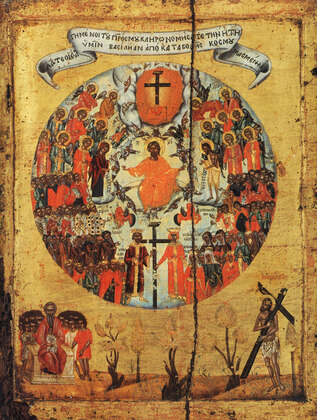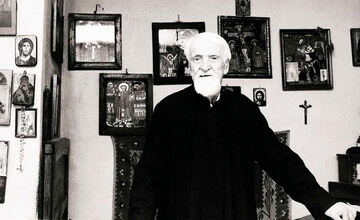The first Sunday after Pentecost is called the Sunday of All Saints. The Holy Fathers dedicated this Sunday of All Saints immediately after the Descent of the Holy Spirit because they, the saints, are the fruit of the Spirit. The Holy Spirit cannot be seen. We see the Savior in icons, but we do not see the Holy Spirit. In fact, He is felt by a pure heart. And, as Father Dumitru Stăniloae said, He is the Comforter Who urges us, from within, to follow Christ and to work out our salvation, to grow in our likeness to Christ. The saints, however, are the visible effect of the work of the Holy Spirit in the world. That’s why we celebrate them all today. And implicitly, we honor and glorify the Holy Spirit.
 Furthermore, this Sunday is for All Saints, including the many unknown saints as well. Saint Porphyrios of Kavsokalyvia says that he acquired grace from a Russian hermit, the old Dimas, who was slandered, ignored by everyone, but who, when he came to the church to worship, thinking he was alone, stretched out his hands up to God, and at that moment he entered into the state of grace. Because the young monk Porphyrios was pure, the firewood was ready for the flame, this state of grace was transmitted to him; he caught fire. Elder Porphyrios said that no one knew this hermit. Moreover, in that area where this father was, Kavsokalyvia, one of the harshest areas in the Holy Mountain, there were many fathers who were found in their cells after two, three days, or even months after they reposed in the Lord. So, there are many unknown saints, glory to God for them. Today we honor them all.
Furthermore, this Sunday is for All Saints, including the many unknown saints as well. Saint Porphyrios of Kavsokalyvia says that he acquired grace from a Russian hermit, the old Dimas, who was slandered, ignored by everyone, but who, when he came to the church to worship, thinking he was alone, stretched out his hands up to God, and at that moment he entered into the state of grace. Because the young monk Porphyrios was pure, the firewood was ready for the flame, this state of grace was transmitted to him; he caught fire. Elder Porphyrios said that no one knew this hermit. Moreover, in that area where this father was, Kavsokalyvia, one of the harshest areas in the Holy Mountain, there were many fathers who were found in their cells after two, three days, or even months after they reposed in the Lord. So, there are many unknown saints, glory to God for them. Today we honor them all.
In the Gospel that was read today, our Lord speaks to us about confessing our faith and says: “Whoever confesses Me before men, him I will also confess before My Father who is in heaven.” And conversely: “Whoever denies me before men, him will I also deny before My Father” (Matthew 10:32-33). Well, it is the saints who par excellence bore witness to God. Not like we confess Him today, only when it is beautiful outside, there is grace in the church, and there is peace. Rather, they confessed God when He was not with them, in prisons and persecutions. God was not visibly there, but only the saints who confessed Him in those hellish conditions were the visible evidence of His existence. In the ancient world, God’s existence was shown when the Christians were eaten by beasts in the Colosseum. This awakened many consciences. As I said before, Saint Justin Martyr was converted after seeing how the Christians were dying. It was something incredible, something like this had never been seen before on earth, for they had serenity when dying. So, through this confession and martyrdom of the Christians, many were converted.
 Then, in the Gospel, some of the “harder” words of the Savior follow: “He who loves father or mother more than Me is not worthy of Me; he who loves his son or daughter more than Me is not worthy of Me; and whoever does not take up his cross and follow Me is not worthy of Me” (Matthew 10:37-38). But the best key to understand the Savior’s words is what Father Dumitru Stăniloae calls “the dialogue of gifts”. Father Stăniloae says that the dialogue of gifts is as follows: first, God gives the gift, He creates, and then He waits for us to enter this dialogue of gifts. But what can we give Him?! We do not have anything. Father Stăniloae says that God is happy when we return His gifts to Him. This is what we do in the Liturgy: “Thine own of Thine own, we offer unto Thee, on behalf of all, and for all”. This is how we enter the dialogue of the gift. God gives us everything when we are nothing. We must also give something, and in this way, we grow in love. This is the dialogue of gifts.
Then, in the Gospel, some of the “harder” words of the Savior follow: “He who loves father or mother more than Me is not worthy of Me; he who loves his son or daughter more than Me is not worthy of Me; and whoever does not take up his cross and follow Me is not worthy of Me” (Matthew 10:37-38). But the best key to understand the Savior’s words is what Father Dumitru Stăniloae calls “the dialogue of gifts”. Father Stăniloae says that the dialogue of gifts is as follows: first, God gives the gift, He creates, and then He waits for us to enter this dialogue of gifts. But what can we give Him?! We do not have anything. Father Stăniloae says that God is happy when we return His gifts to Him. This is what we do in the Liturgy: “Thine own of Thine own, we offer unto Thee, on behalf of all, and for all”. This is how we enter the dialogue of the gift. God gives us everything when we are nothing. We must also give something, and in this way, we grow in love. This is the dialogue of gifts.
We see this par excellence in the Mother of God. She received gifts like no one else. She was full of grace and blessings (cf. Luke 1:28). Then she gave them back to God: as a child she was brought, and offered in the Temple of God, and she gave her whole life to God.
So, if we see the world as a gift from God, we are in truth. Rereading the verses from the Gospel using the key to the gift, it sounds something like this: “Whoever does not see his father, mother, son or daughter as gifts of My love for him or her, he is not worthy of Me.” Or: “He who does not realize that he cannot find the way to salvation without Me and does not leave himself to My will, is not worthy of Me.” And the Father’s will is the Christian’s daily cross. This is a path that we would not choose on our own, and we even run away from it. Because this cross, says Father Arsenie Papacioc, means “to carry what is not convenient to you”. Surely you don’t want to do that. But the Savior says, “He who does not come to follow Me every day, taking/carrying his cross, is not worthy of Me”. Such a person shows that he does not entrust himself to God. He trusts himself more than God.
In both situations (both when we don’t see all good things as a gift from God, and when we run away from the cross) we are blind, we are opaque. In the first situation, we love those in our family more. God does not want us to hate them but wants us to love them using the key He provided. As Father Arsenie also says: “Love God the most, but don’t let others know”. That is, do not take away from your love for others. Rather, you should love everyone very much; you fill everyone, and they all feel your love, but you love God more, because they are His gifts to you, they are the expression of His love for you. Simple. If you see this, you are in the truth. If not, it means that you do not see God because of His gifts. This is the sin of man, and man becomes obtuse because he puffs himself up with the gifts he receives.
We can say the same thing in this way: “If you do not know, if you have forgotten that you are nothing, you are not worthy of Me”. This is how everything is understood, and everything is experienced as a gift. This is how our trust in Him increases and we live in a way worthy of God, because we are in His hand, because He takes care of us even when we are nothing. But we always forget this and blind ourselves to His gifts and shut God out of them.
However, if man enters this dialogue of gifts, he grows, expands, and acquires Life. As Saint Maximus the Confessor says about humility: “Humility is knowing that you have your being with a loan.” This is a truth, that we do not have life in ourselves (cf. John 6:53). Everything we have, we have from God. But gifts can become ours if we know how to assimilate them. One way to appropriate them is to always thank God for the gifts, to always be aware of them and to return them to Him. This gratitude must become as natural as our own breath.
In the saints we see this. That is why they are a gift for everyone.
